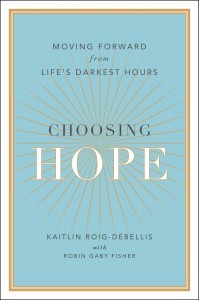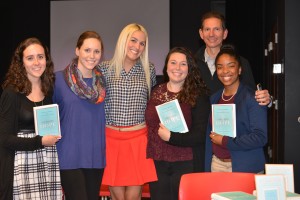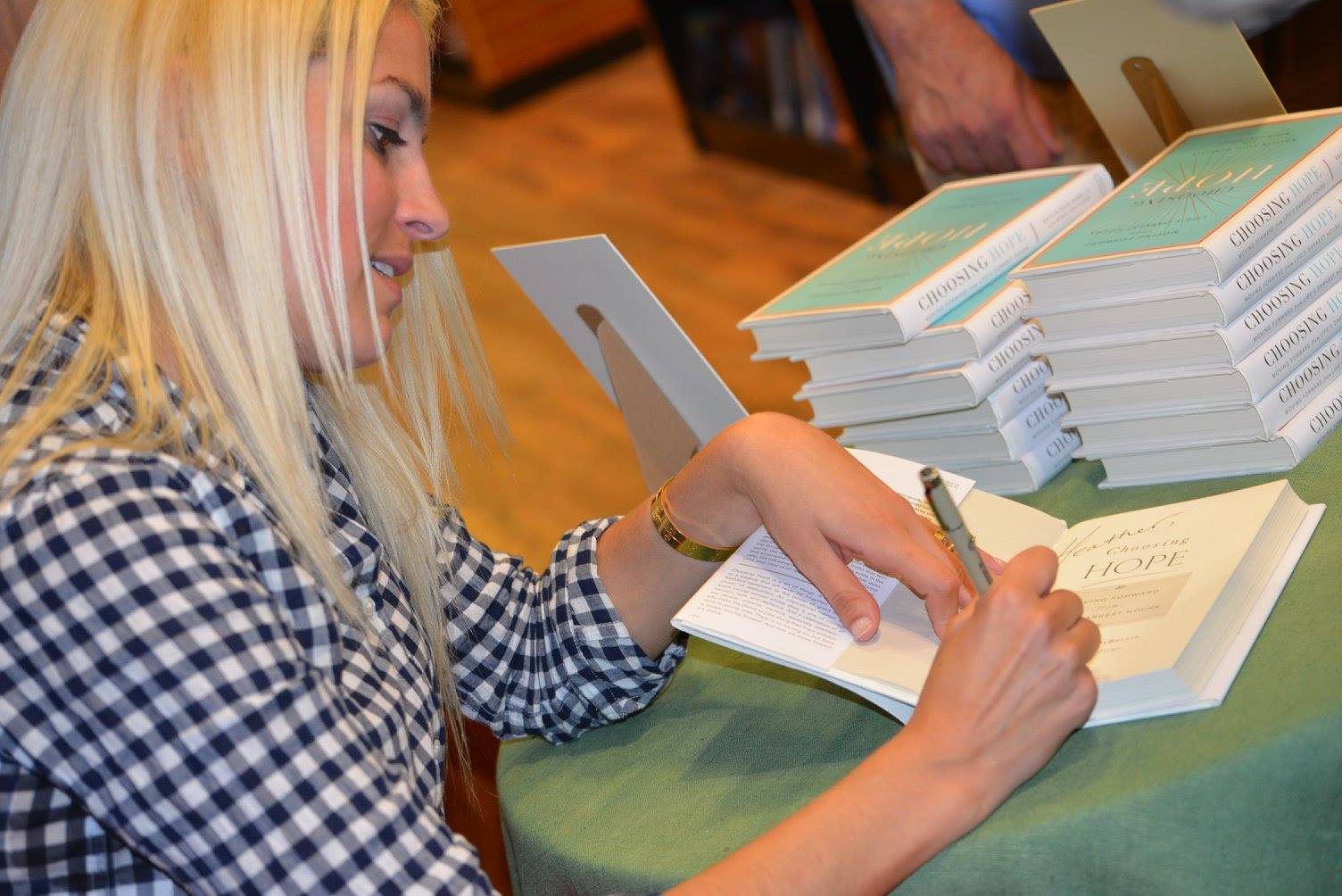Editor’s Note: Former Sandy Hook Elementary School teacher Kaitlin Roig-DeBellis ’05 (ED), ’06 MA, founder of nonprofit Classes 4 Classes and survivor of the tragic 2012 shooting in Newtown, Conn., shares with Spotlight an excerpt of her new book, “Choosing Hope: Moving Forward from Life’s Darkest Hours” (G.P. Putnam’s Sons), which was released Oct. 6.

Choosing Hope
Neag School alum and Sandy Hook survivor Kaitlin Roig-DeBellis ’05 (ED), ’06 MA shares a glimpse into her new memoir, which was released this October.
I live every day wishing I could go back to December 13, back to who I was, who my kids were, back to our school with those who were taken on that day and the life I would have never in a million years have changed.
Sometimes I wonder how all of this happened. How, after finding myself in the midst of such abject darkness, in a place where breaking free seemed unlikely, if not impossible, I was finally able to get to the light. Did my strong faith play a role in my passage from that unimaginable tragedy? Yes, it did. Did the love of my family and friends and the support of a caring community bolster me as I attempted to put one foot in front of the other in the days and weeks afterward? Of course. But what saved me, when I dropped to my lowest point and wandered aimlessly between feelings of sadness and fear and maddening frustration over not being able to answer the “Why?” of what happened, was the moment I realized I had a choice. I could allow the actions of a monster to crush my spirit and, for the rest of my life, have that terrible day in Newtown define me. Or I could decide that, even in the wake of such unspeakable malice, I could live a purposeful life by choosing hope.
“I decided that if, by sharing my personal story, I could help even one person through his or her darkest hour, then that was what I needed to do. I quickly realized that helping them was healing me.”
– Kaitlin Roig-DeBellis ’05 (ED), ’06 MA

The Sandy Hook Elementary School massacre was the worst mass murder of school children in the United States since the Bath School bombing in 1927, and a mournful chapter in our country’s narrative. I’ll leave it to others to write the historical account of that day. I’ve agreed to tell my story, but on my terms. I will not be exploitative: anyone who is looking for that should reach for a different book. I will bear witness to the trauma my students and I suffered, and, even more significantly, the acts of heroism that day, and the generosity of others that poured into our broken community afterward. I write about my personal experience for the purpose of clarify and perspective. It is that which led me to the path I walk today.
Six of my colleagues and twenty first-graders – six- and seven-year-olds who were still learning to tell time, and count to 120, and spell 100 words – were murdered that morning. Teachers and administrators and support staff and children who acted with great courage in the face of death. By the grace of God, my students and I survived. When the shooting began and the killer stalked down the hallway toward our classroom, leaving a trail of devastation in his wake, I stuffed my frantic students into a first-grade bathroom that was too tiny for one adult and told them to stay perfectly quiet. I was certain we were going to die.
I won’t say the shooter’s name. I never have. The only names that need to be memorialized are the innocent children and educators whose lives he took. To this day, I believe the killer came into our classroom, which was the first one in the hallway, and, thinking it was empty, moved to the next classroom, and the next, shooting everyone he saw. I’ll never know for sure.
When you hear the whisper of death, life takes on a different meaning. Not a moment passes when I don’t recognize that it could have been us who didn’t make it out of the school that day. That all of my students and I did get out alive is, in my mind, nothing short of a miracle. I honor that miracle by not taking anything for granted. Not a beautiful sunset, or the gentle sensation of a loved one’s hand reaching for mine, or the sweet sound of a child’s voice, or a kind word from a stranger. Not for a second.
Because we survived, I must live up to my responsibility to those who were silenced by using my voice to share what I have learned from standing at the precipice of death and, in doing so, making sure that day is not forgotten. Had it been my kids and me who were taken, I would have wanted someone to use his or her voice for good and to carry on the legacy of love and benevolence that, before evil visited, was the story of Sandy Hook.
In the weeks after the shooting, I waded through my sorrow, wondering if I would ever feel joy again. I spent every day asking myself, Why our school? Why innocent children? When the answers wouldn’t come, I became increasingly frustrated and angry. Until, one day, I realized I would never answer those questions and I needed to concentrate on the ones I could answer, for the sake of both my students and me. Only then could we begin healing. Two questions guided me: How do I make sure that the deeds of a madman do not prevent us from moving forward to live good and meaningful lives? And how do we gain back the sense of control that he took from us? Those two questions led me in everything I did. Rather than consuming myself with the horror of what happened, I began focusing on the good that could be done, and how I might take part in our collective healing.
When I changed my thinking, opportunities began to present themselves. I founded a nonprofit called Classes 4 Classes, a concept to teach students everywhere the importance of kindness and caring for others. In my capacity as a survivor, I was asked to speak to a group of educators, which I reluctantly accepted. I started my presentation by sharing my story of hope and saw the impact it had on the audience. One speaking engagement led to dozens. Following every appearance, people came up to me to share their personal struggles – “I was just diagnosed with cancer”; “I lost my husband”; “My son is going through a difficult time” – and to thank me for inspiring them to focus on the possibilities rather than the negativity in their lives. They would often begin by saying things such as “I know this is nothing like what you’ve been through” or “My struggle can’t compare with yours,” and I would stop them each time and say, “Pain is pain and sadness is sadness and loss is loss and we are all connected in this.”
After a few of those encounters, I decided that if, by sharing my personal story, I could help even one person through his or her darkest hour, then that was what I needed to do. I quickly realized that helping them was healing me. Sharing my message of hope became my calling. So when I was approached about writing a book, something that had never crossed my mind, I decided to seize the opportunity to be able to reach even more people.
The Sandy Hook Elementary School I knew closed its doors for good after the shooting. Our beautiful school is dust now, razed to the soil because what it came to represent was too painful for a community to bear. And while teaching is at the core of who I am, my new classroom is wherever life takes me – to elementary schools, and teacher conferences, and college commencements, and anywhere else I am asked to speak.
In my travels and, now, with my book, my purpose is to convey the importance of gratitude and endurance and, most of all, the power of choice. Yes, especially that. I know now that how you deal with life’s challenges, even those that may seem unbearable or hopeless, is your choice to make. Bad things happen to all of us, things that test us and impact us and change us, but it is not those moments that define who we are. It is how we choose to react to them that does. You can give in and give up or you can decide to live your life with intent and love and compassion for others and for yourself. You can choose hope, even in the darkest hour, and in that choice you will find light. We have that power. I do. You do. Everyone does. That is what I believe.
From CHOOSING HOPE by Kaitlin Roig-DeBellis, to be published on October 6, 2015 by G.P. Putnam’s Sons, an imprint of Penguin Publishing Group, a division of Penguin Random House LLC. Copyright © 2015 by Kaitlin Roig-DeBellis.



